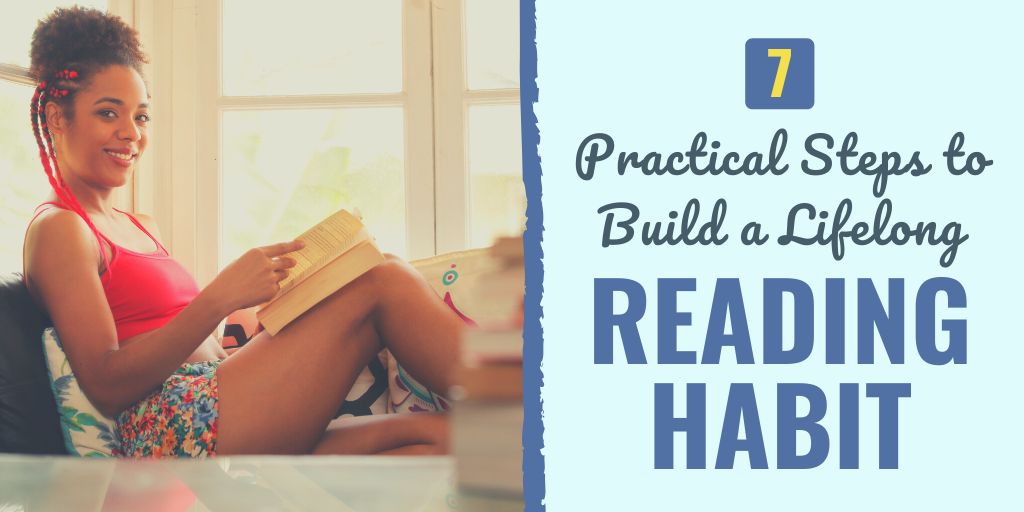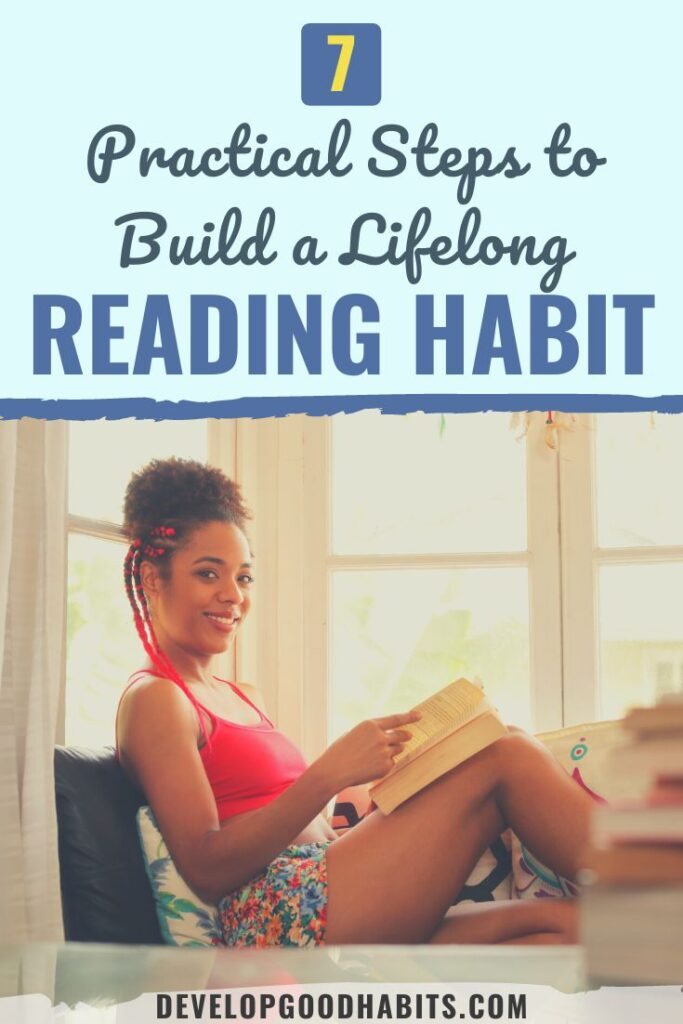I spend a lot of time each week encouraging my six-year-old to read. And while she doesn’t dislike reading, if given the choice, she’s going to choose to go outside or play with slime 100% of the time.
I get it…the books she’s tasked with reading are repetitive and increasingly challenging for her. But, knowing all the benefits of reading, I want to instill this lifelong habit in her.
I want to be able to set her up for success–both personally and professionally– and help her enjoy the process of learning new things on her own outside of a classroom setting.
If you’re like my daughter and you find that you can come up with a lot of excuses to not read, you may benefit from some tips to help you build this healthy habit. So in this article, we will look at 7 steps you can take to read more on a daily basis.
Now, if you’re not a bookworm quite yet, it’s ok! But before dismissing the idea of reading, take some time to learn why reading is important and how it can help you.
Let’s look at some of the benefits of reading and why it’s such an important factor in your overall well being.
Why Is Reading Important?
Aside from being one of the simple pleasures in life you can enjoy, reading has a comprehensive list of benefits that can improve your life at any age. First off, reading will help keep your mind young for years to come.
In fact, studies have found that reading throughout your life can help stave off Alzheimer’s disease. Annual tests and autopsies of research subjects showed that those who read a lot had a reduced rate of memory decline when compared with those who didn’t read much.
Reading can also help you improve your levels of focus and concentration because it prevents you from multitasking and helps you practice focusing on just one thing at a time.

People who can focus for long periods of time can work efficiently, which means they know how to work smarter rather than working harder. (Read this article on how to better concentrate while reading.)
Learning how to focus properly is what allows you to screen out irrelevant information and pay exclusive attention to the stimuli in the moment that actually matters.
This is an important skill to have no matter what you’re doing– whether you’re studying for an important test or you’re on a first date trying to learn about the person sitting across from you.
Reading can also help reduce stress because it can take your mind off of everyday problems and help you focus on something that you’re interested in.
Studies show that reading for just six minutes can reduce muscle tension, slow elevated heart rates, and reduce overall stress by up to 68%. Reading can relax your mind and body, preventing the development of stress-related health conditions and promoting a clearer mind.
If you’re going through a hard time, reading can help by offering a sense of belonging. Reading other people’s stories who have faced and survived similar struggles can be inspirational.
By reading about someone else’s journey, you may be able to get the motivation that you need to persevere through a challenging time in your life.
And, unlike watching television, reading elicits creativity as you’re tasked with picturing the story or circumstances that the author is describing. This helps boost the imagination of people of all ages. And, the more you read, the broader your imagination will get.
With a lifelong reading habit, you will continue to gain knowledge and become exposed to new ideas that will allow you to experience and analyze the world through a new perspective offered through the stories and lives of other people.
Hopefully you’re convinced by now that reading is a beneficial hobby to adopt. Here is a step-by-step process that you can implement to ensure you start reading more on a daily basis.
7 Steps to Build a Lifelong Reading Habit
1. Write Reading Goals
To make reading a habit, you have to start by setting an articulate goal and defining your reason behind it.
Do you want to read more to help cultivate personal growth? Or do you want to broaden your general knowledge? No matter what your “why” is, attach this purpose to your SMART reading goal to keep you motivated.
Your goal could be to read one book per month (or 12 per year), or to read a book on a new topic every other week (or whatever makes sense according to how fast you read).
Or, you could set out to read 20 pages every night before you go to sleep. A goal like this will help you stay focused because it establishes a time and place for you to address your reading goal every day.
Focus will lead to more efficiency in your reading and before you know it, reading will become part of your daily routine.
No matter what your goal is, make the process something you look forward to–not something that seems like a chore.
2. Download the Kindle App
The Kindle app is easy to use and offers users the ability to buy books instantly, which gives you endless options at your fingertips for reading material that’s right up your alley.
Kindle offers a lot of books for free and you can get newer books for a fraction of the cost of buying them in print. Kindle also grants you access to check out e-books from most libraries in the US.
The Kindle app makes reading easier because it has a dictionary and a translation feature, allowing you to immediately see the definition of unfamiliar words (or the translation of words in different languages) which can help you build your vocabulary.
But most of all, the Kindle app allows you to keep your reading material with you at all times, so whenever you find a free moment, you can take your book out and enjoy whatever you’re reading.
3. Get Public Accountability
Holding yourself accountable for reading on a public platform will help you stay on track with developing this habit. With this type of structure, you won’t want to let other people down by letting your goal fall through the cracks.
One way to get public accountability is to join Goodreads, which is a social network for people who love to read. When on Goodreads, you can make connections with friends to see their comments and reviews on whatever books they’ve read. You can also “follow” people to simply see what they’re reading.
Finally, Goodreads offers online communities (both open and closed) where people can engage in conversation with other readers, connect with people who have a similar niche reading interest, or just lurk to see what other people are talking about.
Goodreads also offers a variety of tools to give you future book recommendations. Not only do they list books you might love based on what you’ve read, they also have a tool that allows you to connect with other readers who have given a book the same rating that you did.
So, if you read a book and give it a 4-star rating, you can use Goodreads to see who else offered the book a 4-star rating and then look through their profile to see what other books they’ve enjoyed. You can also follow people’s reviews to uncover more books you should add to your reading list.
This site will build you a personalized reader profile based on your reviews of books. Once you gain a following (which will take a good amount of reading in itself), you can start posting about your reading goals.
This will help hold you publicly accountable because your followers will be able to see when you meet your goals and some fellow readers may even be waiting on your review before picking up a certain book.
You can also gain accountability by joining a reading group. With a book club, you’ll need to have a concrete strategy that keeps you motivated to read on a regular basis.
Book club gatherings give you the chance to talk about lessons you learned while reading the book of choice in addition to any other thoughts you may have to share with the group.
Not so sure about sharing your goals? Take a few minutes to watch the video below to help you decide whether you should share your reading goals or not.
4. Give It Time
Make a rule for yourself to make reading feel like less of a commitment. If you’re not sold on a book, read 30 pages before making the decision to finish it or put it away. When you do this, you will know that you can try to read any book that you want without feeling obligated to finish it.
It’s important to give a book a chance. There was something about it that initially drew you to it, and it may just need some time to live up to your expectations.
If you give up on every book too quickly without giving yourself a fair opportunity to enjoy it, you may find that you’re not finishing very many books.
With that said…
5. Know When to Call It Quits
When you can’t connect with whatever you’re reading, the process starts to feel more like a tedious chore than a fun hobby. This can typically happen for two reasons–either the book is too wordy and uses a lot of vocabulary that you’re not familiar with or you find that the book is poorly written or just flat-out bad.
Here are some tips to keep in mind.
Keep reading if:
Give up if:
Remember, you can always come back to a book that you decide to put away for now. You may find you have a stronger connection to it at a different point in your life.
6. Keep a List
Keep a list of all the books you’re interested in reading. This way, you’ll never run out of books to read and you won’t lose your momentum when you finish a book.
This should be a living document that’s easy to access (maybe put it in your phone or in your journal) so you can add to your list whenever someone mentions a book that you may be interested in. If you have a Goodreads account, this is also a great place to maintain your list.
Cross out the books that you read as you go. This will help you feel a sense of accomplishment every time you finish a book.
Keeping a list will help prevent you from only reading sporadically or taking a long break from reading. It will also ensure that you never “settle” for a book because you want to keep reading but don’t have anything picked out.
7. Make Reading Your “Go-to” Activity
If you’re like many people, when you’re waiting in line at the pharmacy or you’re the passenger on a long car ride, you reach for your phone and start scrolling through social media or playing a game to help pass the time.
To build a lifelong reading habit, make reading your default activity to fight boredom instead. Make sure to keep your book with you (or have the Kindle app) so you can read a bit at every opportunity you have.
The more you turn to reading for entertainment, the deeper you will solidify this lifelong habit.
Final Thoughts on Building a Lifelong Reading Habit
There are a lot of benefits to having a lifelong reading habit. By taking small, consistent steps, you can develop this habit and build it into your everyday routine.
No matter what your age is, reading is a healthy habit that allows you to learn new things, maintain a creative mind, and have an escape from your everyday life.
And if you're looking for more resources to improve your learning skills, these articles might help:
- 13 SMART Goals Examples to Improve Reading Comprehension
- 7 Ways Read More Books & Retain the Information
- 9 Reasons Continuous Learning is Important for Your Life

Connie Mathers is a professional editor and freelance writer. She holds a Bachelor's Degree in Marketing and a Master’s Degree in Social Work. When she is not writing, Connie is either spending time with her daughter and two dogs, running, or working at her full-time job as a social worker in Richmond, VA.


